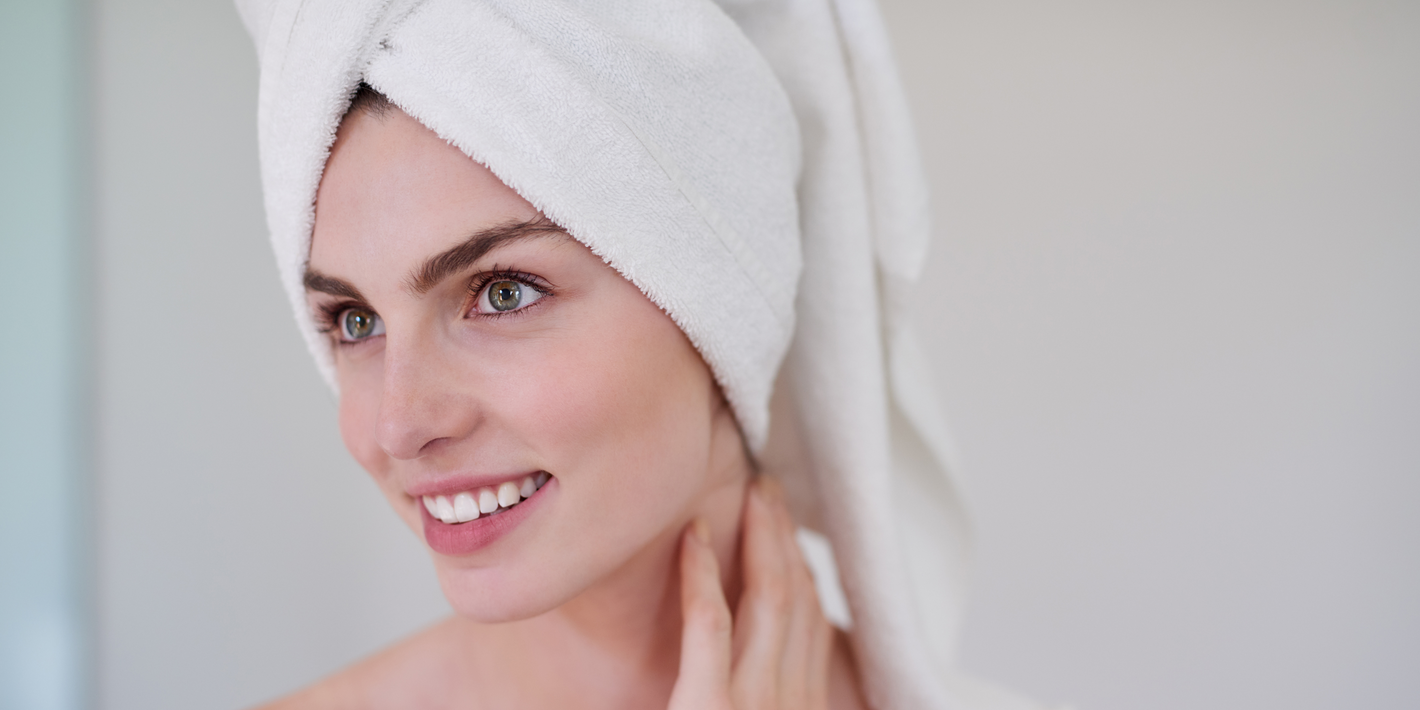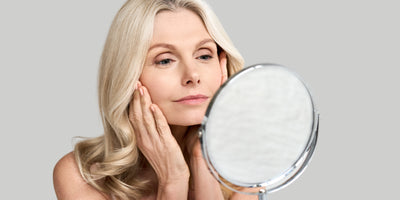
The Amazing Health Benefits of Astaxanthin For Your Skin
The journey to radiant, youthful skin has a new hero in the skincare realm - Astaxanthin. This vibrant red pigment, naturally occurring in certain algae and seafood, has stirred up excitement for its multifaceted skin benefits. From acting as a potent antioxidant to promoting collagen production, Astaxanthin is winning over beauty enthusiasts and dermatologists alike. In this comprehensive guide, we'll explore the extraordinary benefits of Astaxanthin for your skin and provide valuable tips on incorporating it into your skincare routine.
A Powerful Antioxidant for Skin
Astaxanthin, a carotenoid pigment, can be found in microalgae, yeast, salmon, trout, krill, shrimp, and crayfish. Its antioxidant capabilities outstrip those of many well-known antioxidants, including Vitamin C and Vitamin E. But why is it essential for your skin health?
Firstly, antioxidants like Astaxanthin protect the skin from oxidative stress caused by free radicals. These unstable molecules can damage skin cells, accelerating aging and contributing to skin disorders. By neutralising free radicals, Astaxanthin helps to maintain the health and vitality of your skin. Moreover, research suggests that Astaxanthin can improve blood flow, providing additional nutrients and oxygen to the skin surface, further enhancing skin health.
Astaxanthin's antioxidant prowess extends beyond the neutralisation of free radicals. It also protects skin cells from the damaging effects of ultraviolet (UV) radiation. By reducing oxidative stress, Astaxanthin can minimise the inflammation often seen in sunburn, acting as an internal sunblock.
Finally, Astaxanthin offers excellent biocompatibility. Being a naturally derived compound, it poses a lower risk of adverse reactions, making it suitable for sensitive skin types.
Incorporating Astaxanthin into Your Skincare Routine
With its powerful benefits, you may be wondering how to incorporate astaxanthin into your skincare routine. Here are some tips to help you get started:
-
Choose quality products: Look for skincare products that contain astaxanthin derived from natural sources, such as microalgae. Opt for reputable brands that ensure the purity and potency of their ingredients.
-
Combine with other antioxidants: To further boost your skin's defense against oxidative stress, consider using products that combine astaxanthin with other antioxidants, such as vitamin C, vitamin E, and niacinamide.
-
Apply consistently: Consistent application is key to seeing the full benefits of astaxanthin. Incorporate it into your daily skincare routine, and be patient, as it may take several weeks to notice improvements in your skin's appearance.
Astaxanthin for Different Skin Types
Astaxanthin's versatile nature makes it suitable for various skin types:
- Dry skin: Astaxanthin's hydrating properties can help improve skin barrier function and retain moisture, providing relief for dry, flaky skin.
- Oily or acne-prone skin: Its anti-inflammatory properties can help reduce redness and inflammation associated with acne breakouts, while its antioxidant properties can help prevent further damage.
- Sensitive skin: Astaxanthin's calming effects can help soothe irritation and redness commonly experienced by those with sensitive skin.
- Mature skin: The potent antioxidant properties of astaxanthin can help protect against premature aging, improving skin elasticity and firmness.
Astaxanthin's Natural Shield Against Sun Damage
Extended exposure to UV radiation from the sun is one of the primary causes of premature skin aging. It leads to the formation of wrinkles, age spots, and increases the risk of skin cancer. Astaxanthin's unique properties can help safeguard your skin against these damaging effects.
Studies show that Astaxanthin's antioxidant activity effectively reduces UVA-induced damage, promoting healthier skin. Its anti-inflammatory properties also play a crucial role in mitigating sun damage. By reducing inflammation, Astaxanthin helps alleviate the redness and discomfort associated with sunburn.
However, while Astaxanthin provides a level of internal sun protection, it should not replace your sunscreen. Experts recommend combining both for optimal skin defense against harmful UV rays.
Anti-Aging Wonder: Reversing Signs of Premature Aging with Astaxanthin
Astaxanthin's anti-aging potential is drawing increasing interest from the skincare community. Its antioxidant and anti-inflammatory properties help slow down the skin aging process by protecting the skin from oxidative stress and inflammation, two critical factors in premature skin aging.
Astaxanthin's anti-aging benefits are not limited to preventing future damage. Research indicates that it can also improve existing signs of aging. In particular, studies show that Astaxanthin can reduce wrinkles and age spots, enhancing skin's overall appearance.
Additionally, Astaxanthin can improve skin texture and moisture content, contributing to a more youthful appearance. By maintaining hydration levels, it supports skin's natural barrier function, protecting it from environmental stressors and delaying the aging process.
Promoting Skin Elasticity: Astaxanthin's Role in Maintaining Youthful Appearance
Skin elasticity refers to the skin's ability to return to its original shape after being stretched or compressed. This attribute decreases with age, leading to sagging skin and formation of wrinkles. Astaxanthin, with its antioxidant and collagen-boosting properties, plays a vital role in maintaining and enhancing skin elasticity.
Astaxanthin safeguards elastin, the protein responsible for skin elasticity, from damage by free radicals. Moreover, it helps increase the skin's water-holding capacity, which contributes to its firmness and plumpness. As a result, incorporating Astaxanthin into your skincare routine can help maintain a youthful, bounce-back skin texture.
Additionally, Astaxanthin has been shown to stimulate the production of collagen, a protein that provides structure and strength to the skin. By promoting collagen production, Astaxanthin helps keep the skin firm, reducing the appearance of fine lines and wrinkles.
Astaxanthin's Moisturising and Nourishing Effects
Adequate skin hydration is key for maintaining a healthy, radiant complexion. Dry skin can appear dull and can be more prone to aging and skin disorders. Astaxanthin's moisturising effects stem from its ability to improve skin barrier function and increase the skin's capacity to retain water.
By enhancing the skin's barrier function, Astaxanthin helps prevent moisture loss, maintaining the skin's hydration levels. Additionally, its anti-inflammatory properties can alleviate dry skin's symptoms, providing relief from itching and redness.
Moreover, Astaxanthin's potential to stimulate blood circulation could enhance skin hydration. Improved blood flow means more nutrients and oxygen are delivered to skin cells, promoting healthier, well-hydrated skin.
Calming and Soothing Troubled Skin with Astaxanthin
Skin inflammation can result from various triggers, including UV exposure, allergies, and skin disorders like acne or psoriasis. Regardless of the cause, Astaxanthin's anti-inflammatory properties can help soothe inflamed skin.
By mitigating inflammation, Astaxanthin helps reduce redness, swelling, and discomfort associated with skin inflammation. Furthermore, its antioxidant properties protect skin cells from oxidative stress, a common contributor to inflammation. In fact, studies have shown that Astaxanthin can significantly reduce inflammatory markers in the body.
Notably, Astaxanthin's benefits aren't limited to temporary relief. It can also help address the root causes of chronic skin inflammation, providing a long-term solution for healthier skin.
Astaxanthin's Potential in Lightening Hyperpigmentation
Hyperpigmentation, characterised by dark patches on the skin, results from excess melanin production. Several factors can trigger this, including sun exposure, hormonal changes, and inflammation. Astaxanthin has shown promise in improving hyperpigmentation and promoting an even skin tone.
Astaxanthin's anti-inflammatory and antioxidant properties help reduce skin inflammation and oxidative stress, two key factors contributing to hyperpigmentation. By addressing these factors, Astaxanthin may help prevent and lighten hyperpigmentation.
Additionally, studies suggest Astaxanthin can inhibit melanin production, further helping to prevent and improve hyperpigmentation. While more research is needed to fully understand its effects on skin pigmentation, Astaxanthin offers exciting potential for enhancing skin's appearance.
Boosting Collagen Production: Astaxanthin's Contribution to Firm and Plump Skin
Collagen, the most abundant protein in the human body, gives our skin its structure and strength. As we age, collagen production decreases, leading to wrinkles and sagging skin. Astaxanthin's potential to boost collagen synthesis is another reason it's gaining recognition in the skincare world.
Research indicates that Astaxanthin can stimulate collagen production, helping to maintain firm and plump skin. By protecting existing collagen from damage and promoting new collagen synthesis, Astaxanthin offers a dual-action approach for preserving skin's youthful appearance.
Moreover, Astaxanthin's antioxidant properties protect collagen fibers from damage by free radicals, ensuring their integrity and functionality. Thus, Astaxanthin contributes to the overall health and resilience of your skin, giving it a youthful, firm appearance.
Incorporating Astaxanthin into Your Skincare Routine: Tips and Recommendations
Now that we understand the amazing benefits of Astaxanthin for skin health, how do we incorporate it into our skincare routine?
Astaxanthin can be used both topically and orally for skin health. For topical use, look for creams, serums, or lotions that contain Astaxanthin as one of the primary ingredients. These products can be applied directly to the skin after cleansing and toning. Regular application can help harness Astaxanthin's antioxidant, anti-inflammatory, and collagen-boosting benefits for the skin.
Oral supplementation with Astaxanthin can also be beneficial for skin health. It's available in the form of capsules, tablets, or soft gels. Regular consumption can offer systemic benefits, enhancing overall skin health from within. However, as with all supplements, it's recommended to consult with a healthcare professional before starting any new supplement regimen.
Whether you choose to use Astaxanthin topically or orally, consistency is key. Regular and prolonged use is necessary to see significant improvements in your skin health. Also, while Astaxanthin is generally safe for most individuals, it's important to do a patch test for topical products or consult a healthcare professional before starting oral supplementation, especially if you have any underlying health conditions.
The Ultimate Addition to a Balanced Skincare Routine
The journey towards radiant, healthy skin is multifaceted and unique to each individual. It includes a balanced diet, adequate sleep, regular exercise, sun protection, and a skincare routine that caters to individual skin needs. The addition of astaxanthin, with its numerous health benefits, is an incredible enhancement to this routine.
However, while astaxanthin offers remarkable skin benefits, it's important to approach it as part of a comprehensive skincare routine rather than a standalone miracle solution. A single ingredient, however potent, may not address all skin concerns. Therefore, astaxanthin should be used in conjunction with other skincare products to address a wide range of skin needs.
For instance, while astaxanthin is known for its hydrating properties, it should be complemented with a good moisturiser to ensure optimum skin hydration. Similarly, while astaxanthin can protect the skin from sun damage, it should not replace a broad-spectrum sunscreen that offers comprehensive protection against UVA and UVB rays.
Tailoring Astaxanthin to Your Needs
When introducing astaxanthin to your skincare routine, it's essential to tailor its usage to your specific needs and skin type. The concentration of astaxanthin in skincare products can vary, so it's vital to choose a product that suits your skin sensitivity and the intensity of your skin concerns.
Sensitive skin types might prefer a lower concentration of astaxanthin to minimise potential irritation. On the other hand, those with more resilient skin or severe skin concerns might benefit from higher concentrations. Regardless, introducing astaxanthin gradually and monitoring your skin's response is a prudent approach.
Challenges in Astaxanthin Usage: What You Need to Know
While astaxanthin is generally safe and beneficial for skin health, some challenges may arise. Firstly, its intense red pigment can potentially stain clothing or skin, especially in high concentrations. While this is not harmful, it's something to consider when choosing and applying astaxanthin products.
Secondly, astaxanthin is not a quick-fix solution. Like many natural ingredients, it takes time and consistent usage to see significant results. Therefore, patience and perseverance are key.
Lastly, while astaxanthin is a powerful antioxidant, it's not the only solution for fighting oxidative stress. Other lifestyle changes, such as adopting a balanced diet rich in other antioxidants, reducing stress levels, and limiting exposure to environmental pollutants, can also help.
Conculsion
In the quest for healthy, vibrant skin, the powerful antioxidant Astaxanthin is an undisputed ally. Its myriad of skin benefits, including its potential to protect against UV damage, boost collagen production, improve hydration, and soothe inflammation, highlight its value in any skincare routine. It's a promising natural ingredient that can make a profound difference in your skin's health and appearance.
However, while Astaxanthin is a powerful and beneficial ingredient, it's essential to remember that skin health is multifactorial. No single ingredient, even one as potent as Astaxanthin, is a silver bullet for all skin concerns. A balanced lifestyle, comprehensive skincare regimen, and a diet rich in a variety of antioxidants are crucial elements in achieving and maintaining radiant skin.
Furthermore, the incorporation of Astaxanthin in your skincare routine should be personalised, considering your individual skin type, concerns, and goals. Always remember to listen to your skin's needs and adjust your skincare regimen accordingly.
Astaxanthin is not just a trend; it's a scientifically backed ingredient that is paving the way to the future of skincare. As we continue to explore its vast potential, we can look forward to even more refined and effective ways of using Astaxanthin for maintaining the beauty of our skin. Indeed, the Astaxanthin advantage may well be the secret to unlocking your skin's true potential.
Summary
1. Powerful Antioxidant Astaxanthin is a potent antioxidant that helps neutralise free radicals, reducing oxidative stress and preventing damage to the skin caused by UV radiation, pollution, and other environmental factors.
2. Anti-Inflammatory Properties Astaxanthin possesses anti-inflammatory properties that can help alleviate redness, swelling, and irritation in the skin, making it an ideal ingredient for soothing sensitive or inflamed skin.
3. Supports Collagen Production Astaxanthin aids in collagen synthesis, which is essential for maintaining the skin's firmness, elasticity, and youthful appearance. By supporting collagen production, astaxanthin may help reduce the appearance of fine lines and wrinkles.
4. Protects Against UV Damage Astaxanthin helps protect the skin from the harmful effects of UV radiation, by both reducing oxidative stress and inhibiting the production of melanin, which contributes to pigmentation and sunspots.
5. Enhances Skin Moisture Astaxanthin has been shown to improve skin moisture levels, leading to smoother, more hydrated skin. Increased skin hydration can help combat dryness, flakiness, and signs of aging.
6. Improves Skin Texture and Tone By reducing inflammation and promoting collagen production, astaxanthin can help improve overall skin texture and tone, leading to a more even complexion and reduced appearance of blemishes and imperfections.
7. Boosts Cell Regeneration Astaxanthin can stimulate skin cell regeneration, promoting the growth of new, healthy skin cells and aiding in the repair of damaged tissue. This can help the skin recover more quickly from injuries, irritation, or inflammation.
8. Reduces Hyperpigmentation Astaxanthin's antioxidant properties and ability to inhibit melanin production may help reduce the appearance of hyperpigmentation, such as age spots and melasma, resulting in a more even skin tone.
9. Enhances Skin Barrier Function Astaxanthin can help strengthen the skin's barrier function, protecting it from environmental stressors and irritants while also helping to retain moisture within the skin.
10. Synergistic Effects with Other Skincare Ingredients Astaxanthin can be combined with other skincare ingredients, such as vitamin C and E, to enhance their antioxidant properties and provide even greater benefits for the skin.






